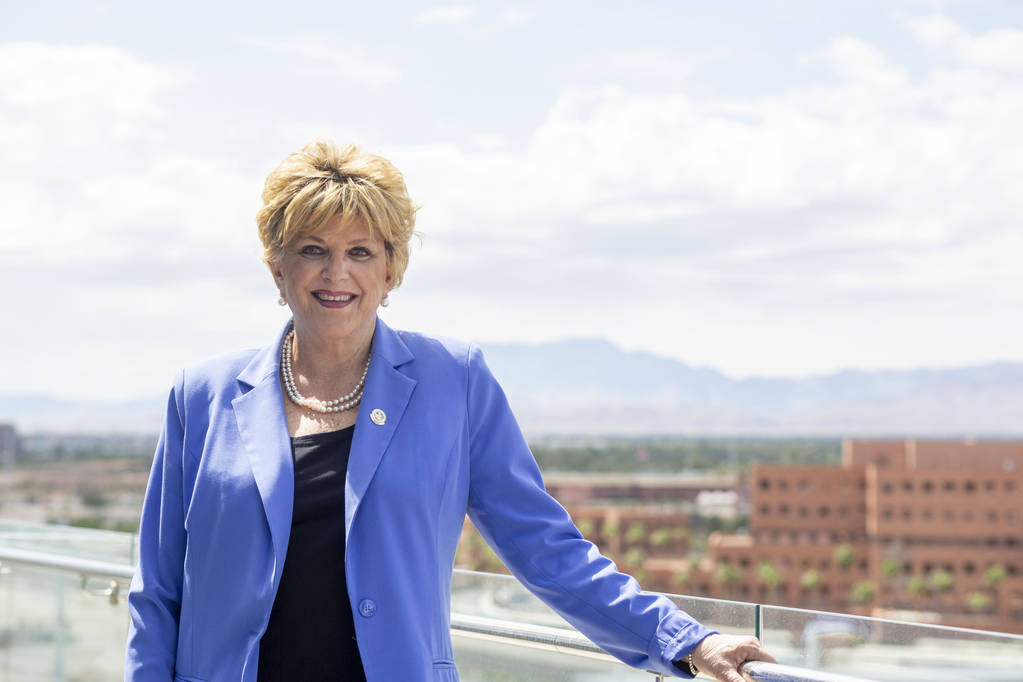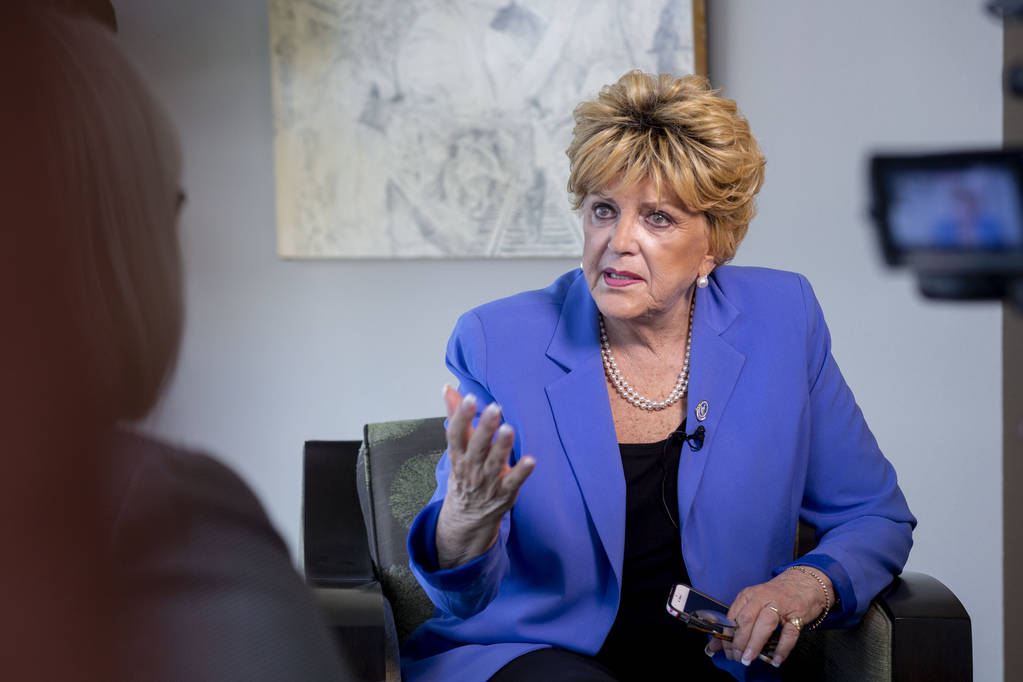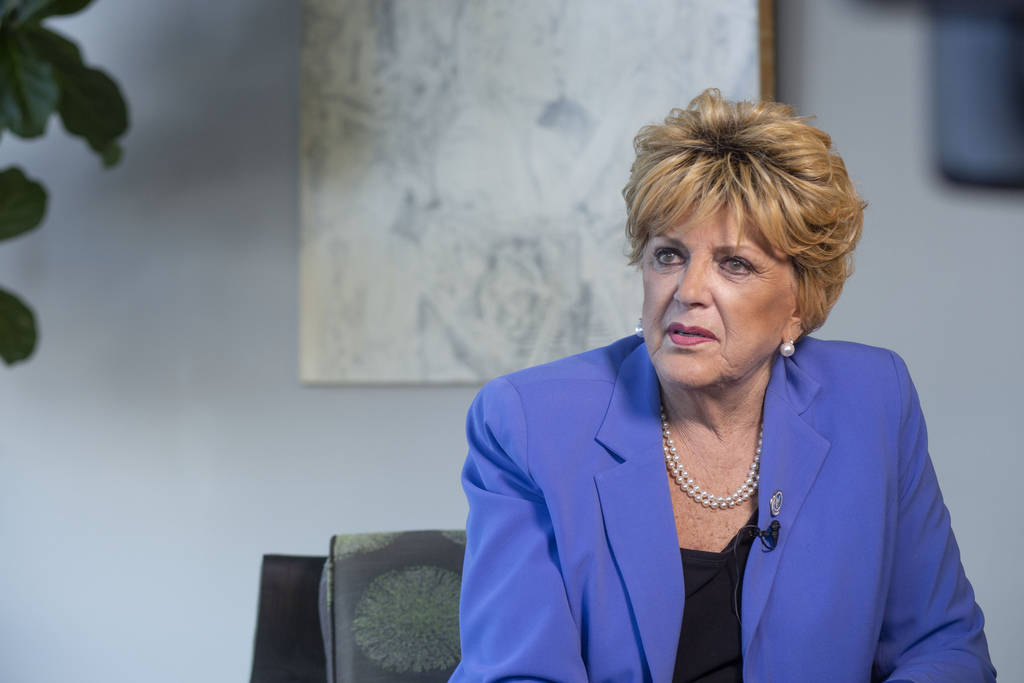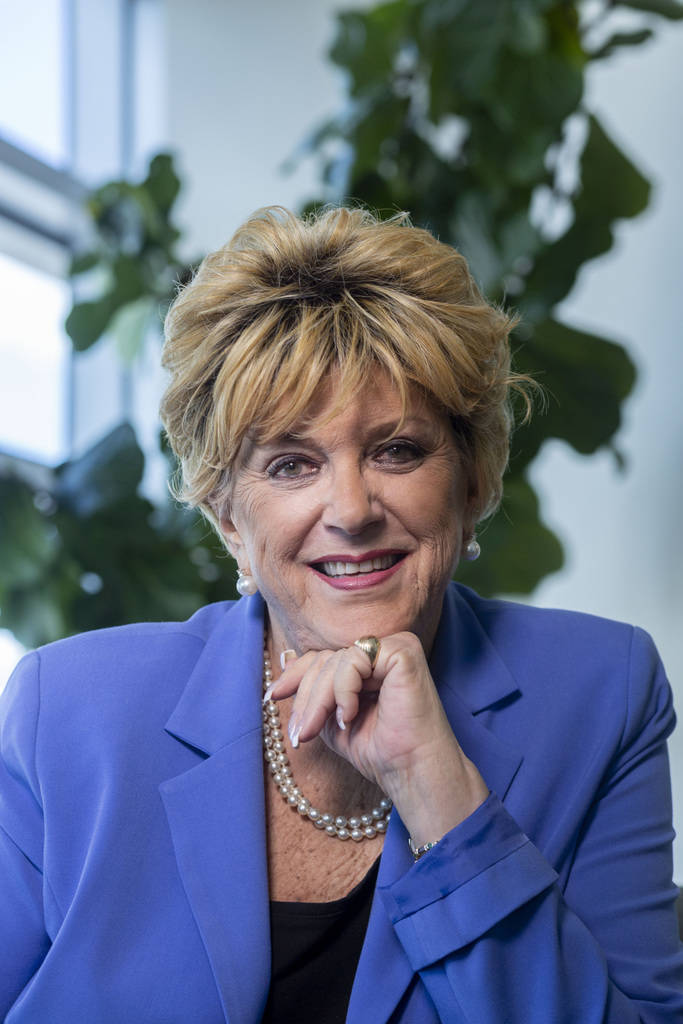Las Vegas Mayor Carolyn Goodman shares story of cancer fight
For Las Vegas Mayor Carolyn Goodman, the worst part of her second breast cancer diagnosis wasn’t telling her four children she was sick again a decade after her first diagnosis.
It wasn’t the infection during chemotherapy that made her so weak she couldn’t stand up, let alone attend her own re-election party.
And it wasn’t losing her hair, her energy and hours at a time sitting in a chair as a chemotherapy cocktail dripped into her veins.
It was the fear of the unknown that came when she knew she was sick but not how sick. The fear that enveloped her in the interval between initial diagnosis and prognosis, before her doctors could tell her whether the cancer had spread and how far.
Goodman, 80, recalls wondering, “Do I have a month to live? Where is it in my body?” as she lay in bed at night, sleep eluding her.
“The anxiety that you undergo at that time is probably the worst part of anything,” the mayor said in her first extended interview about her cancer treatment and recovery since her diagnosis in January.
“I wasn’t ready to go to the next level,” said Goodman, who feared she would die. “I have four beautiful children who are married, six grandchildren, a sister and extended family.
“But most importantly, I have the man I’ve been married to for 57 years, and we’re just like one soul together. … He doesn’t know how to change a lightbulb, fix a sprinkler, put a picture on the wall, cook. Well, he can cook a few meals. That was my biggest concern.”
Oscar Goodman, who preceded his wife as mayor, said he “couldn’t breathe” when he heard the diagnosis.
“I love her more than life itself,” he said in a phone interview. “It’s a mutual worrydom.”
‘Switch turned on’
Carolyn Goodman said that once she had the “total truth” of her illness, a “switch turned on” that shifted her focus and eased her anxiety.
“I knew I had a job to do, to run a city and make it the best, and to be as effective as I could,” the mayor said.
“I’m a very practical person,” she continued. “I want facts, and I want truth. Truth is extremely important to me, almost to the point of sickness. Tell me the truth and I can handle it.”
As the facts became clear, Goodman learned she had a 2-centimeter cancerous growth in her right breast, and there was cancer in a lymph node in her right armpit, Dr. Karen Jacks, Goodman’s medical oncologist at Comprehensive Cancer Centers of Nevada, told the Las Vegas Review-Journal in a separate interview.
In 2009, Goodman had been diagnosed with a type of breast cancer that grows in response to estrogen. The stage 1 cancer in her left breast was treated with surgery — a lumpectomy, which removes the tumor but not the entire breast — along with radiation and five years of anti-estrogen therapy, Jacks said.
This time, Goodman had found a small lump during a self-exam less than a year after her last mammogram. She wasn’t particularly concerned at first, but she went ahead and moved up her annual checkup in anticipation of campaign season.
When Jacks saw her patient, she felt the mass and sent Goodman “for a diagnostic study and ultrasound and all those things that go along with figuring out what’s going on with a patient.”
Testing determined it was a stage 2 breast cancer, which meant it was still at an early stage. But it was triple-negative breast cancer, a potentially aggressive type that isn’t fueled by estrogen, progesterone or a protein called HER2. Fortunately, the cancer had only spread to one lymph node.
Leaning on family
Fighting the cancer quickly became a family affair.
“He was compassionate, kind, encouraging,” Goodman said of her husband, a former defense attorney for organized crime figures who perhaps is better known for being colorful, controversial and unrelenting.
“He could be quiet, just everything I needed,” she said.
“Mr. Goodman was there every step of the way,” Jacks agreed. “Every appointment he was there, holding her hand.”
The mayor said it “broke her heart” to tell her adult children — a daughter and three sons, one of them a medical oncologist at Comprehensive Cancer Centers — about her diagnosis.
“I don’t care how old they are. They’re still your children,” she said.
Goodman first got the news that she had cancer and would need more tests Jan. 10, the day of her State of the City speech. By late January, she was receiving chemotherapy.
“I felt very confident in the team that I had and the plan that was there,” she said.
In part because of the cancerous lymph node, Goodman’s treatment plan included chemotherapy before surgery. “We wanted to address it very aggressively,” Jacks said.
Jacks treated Goodman with four cycles of chemotherapy, which shrinks tumors by targeting rapidly dividing cells such as cancer cells but also affects hair cells. Goodman’s daughter, Cara, began investigating “cold capping,” a process in which a patient wears a helmet-like cap with gel coolant that chills the scalp before, during and after a chemotherapy session. For some patients, the process reduces hair loss and impact on the scalp.
Cara assisted her mother with cold capping during her treatment, but the mayor still lost most of her hair.
“As my hair began to come back, I credited her with that it did,” the mayor said.
Goodman said one thing that “totally amazed” her during her treatment was that her hair began falling out on exactly the 17th day of chemotherapy, just as predicted. She said she began wearing wigs, and the idea of wig shopping became a running gag with her husband.
“Oscar said, ‘Could you get me a toupee?’ … That became sort of like fun. It became positive instead of negative. He asked me just the other day, ‘What ever happened to that wig you were going to get me?’ I said, ‘Well, we haven’t really looked. What color do you want? Do you want a nice long wig?’ ”
Failure not an option
Goodman, who was first elected mayor in 2011 after her husband’s third term, said she discussed with Jacks whether she should seek a third term. Jacks said there was no reason she shouldn’t and many reasons she should.
“Mayor Goodman’s ultimate goal was to come out on the other end and continue to be the mayor of Las Vegas,” Jacks said. “I told her we would get through this. I didn’t see any reason why she couldn’t run for another term. Having a goal and having something to look forward to on the other end is extremely helpful for patients.
“I truly believe that patients in their normal frame of mind and in their normal state of affairs fare way better than those that just sit around and think about what’s going on with them.”
Jacks praises Goodman for showing mental toughness. “There was not a question that she was going to do this and to rock it. Failure was not an option. Complication was not an option. Putting aside what she does on a daily basis was not an option.”
Despite her positive mindset, Goodman did encounter a complication in her fourth round of chemotherapy — one that limited her activity for several weeks.
She developed a urinary tract infection that landed her in the hospital for a few days, where she received intravenous antibiotics, Jacks said. “It was serious enough for me to put her in the hospital and to watch her very, very closely.”
Chemotherapy suppresses the immune system, making it more difficult to fight off infection, so Goodman “needed to be home for a few weeks to recover because she was ill and, on top of that, fatigued from the chemotherapy,” Jacks said.
Goodman recalled missing three weeks of work. “The legs didn’t work. The arms didn’t work. Nothing worked,” she said. “I could barely stand.”
The timing was such that Goodman was unable to attend her own election night watch party April 2, when she was won her third term in a landslide.
‘Totally blessed’
The chemotherapy — once every three weeks for three to three-and-a-half hours — began at the end of January and was completed in May. The next step in treatment was surgery by Dr. Josette Spotts — a lumpectomy and removal of the involved lymph node.
“We found out at the time of surgery that the chemotherapy had worked tremendously well, and there was no sign of cancer left,” Jacks said. “It was quite a phone call to get to make to her. She was just absolutely elated.”
“I was totally blessed,” Goodman said.
Dr. Raul Meoz then treated Goodman with a course of radiation to the right breast and armpit to kill any lingering cancer cells. The radiation was done five days a week for six-and-a-half weeks. Each session took about five minutes.
Goodman’s treatment was completed in August. For now, she’ll continue to see Jacks once every three months. After a couple of years, the appointments will be cut back to every six months.
“She had an early-stage breast cancer treated completely with chemotherapy,” Jacks said. “She should do really well. If you look at the tumors that respond the way hers do, survival without disease at five years is 85 percent. She’s not likely to have a recurrence.”
Goodman said she wanted to share her story during Breast Cancer Awareness Month to provide an example of a Las Vegas medical success story — one in which she received treatment “in a very compassionate but thorough manner” without leaving the Las Vegas Valley.
“I did not have to run to California or back east,” said Goodman, the daughter of a New York City obstetrician-gynecologist. She takes pride in her role in building a medical district in Las Vegas and in the growing medical reputation of Las Vegas. She pointed out a window in her City Hall office to the Cleveland Clinic Lou Ruvo Center for Brain Health as an example.
“I was brought up with the tradition that, when you hear the C-word, you’re in an impossible situation,” Oscar Goodman said. “I’ve since learned that with your attitude, with her great care by Comprehensive Cancer and the doctors there, her willingness to do everything that needed to be done to beat it, it can be beaten.”
The former mayor also believes the genuine concern, well wishes and prayers of community members made a difference.
“When I tell them that she’s cancer-free, they beam, as if something good happened to them,” he said.
Contact Mary Hynes at mhynes@reviewjournal.com or 702-383-0336. Follow @MaryHynes1 on Twitter.
Screening guidelines
Dr. Karen Jacks with Comprehensive Cancer Centers recommends that women at average risk for breast cancer begin getting annual mammograms at age 40.
She suggests that women talk with their physicians to determine what's right for them, noting that
that different organizations offer differing guidance.
For instance, The American College of Physicians recommends a mammogram every other year for women ages 50 to 74 who are at average risk for breast cancer and have no symptoms.
The American Cancer Society recommends that yearly screenings begin by age 45, and can change to every other year at 55.
Health care providers also recommend breast self-awareness, so that women become familiar with the normal look and feel of their breasts. This way, they can tell their health care provider of any changes.





















